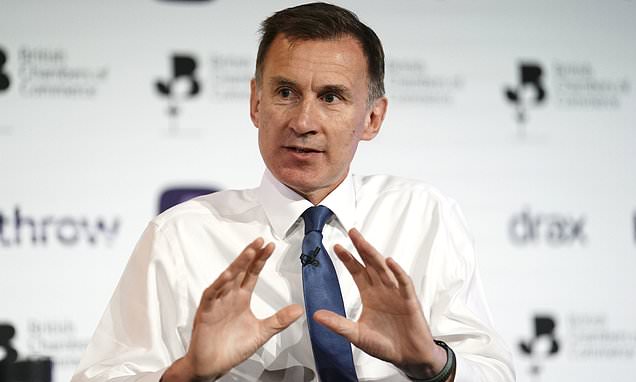
- Payments could increase by £13,200 by end of year compared to 18 months ago
- HSBC pulled its mortgage offers from the market for a second time in a week
- Chancellor Jeremy Hunt says UK has ‘no alternative’ but to hike interest rates
Homeowners with a £300,000 mortgage could see their annual payments rise by £13,200 by the end of the year compared with 18 months ago, analysis has found.
Lenders have rushed to hike their rates and withdraw entire ranges of deals in recent weeks amid predictions that the Bank of England’s interest rate could hit 6 per cent.
HSBC pulled its mortgage offers from the market for the second time in a week yesterday after the bank struggled to meet a flood of applications from borrowers. Its mortgage deals will be back on sale today at higher rates.
And one of Britain’s biggest building societies, Coventry, announced it was suspending its residential and buy-to-let deals from the market at 8pm yesterday before launching new, more expensive products on Friday.
Chancellor Jeremy Hunt warned the UK has ‘no alternative’ but to hike interest rates again to tame runaway inflation. He said the Government would be unstinting in its support for the Bank of England ‘to do what it takes’ to slow the rate of price rises, which is now the ‘number one challenge we face’.
The Bank is widely expected to raise the base rate from its current level of 4.5 per cent, marking the 13th consecutive rise in just 18 months.
Stronger-than-expected growth in wages and the British economy has piled further pressure on the Bank of England to raise rates in a bid to curb inflation.
Financial markets are suggesting interest rates have a one in three chance of hitting 6 per cent by the end of the year.
Mr Hunt said: ‘We understand there is real pressure on families with mortgages, on businesses with loans, as interest rates go up. In the end there is no alternative to bringing down inflation if we want to see consumers spending, if we want to see businesses investing, if we want to see long-term growth and prosperity.’
The Bank of England yesterday admitted that it had underestimated inflation and bowed to pressure to review its forecasts.
Lord Macpherson, a former permanent secretary to the Treasury, suggested the Bank will have no option but to raise interest rates so high that a recession becomes inevitable next year. He criticised the Bank of England for being ‘behind the curve on interest rates’ and signalled further pain for homeowners as bond yields continue to rise.
The cost of UK government borrowing reached its highest levels since the financial crisis on Tuesday, exceeding levels seen in the aftermath of Liz Truss’s mini-Budget last September.
Experts warn this will send further shockwaves into the mortgage market.
So far, the interest rate increases have added £9,564 a year – or £797 a month – for homeowners with a standard variable rate mortgage of £300,000, according to broker L&C Mortgages. Around 1.6million homeowners have a SVR mortgage, which typically increase in line with the base rate. But further shock increases to mortgage payments are on the way as rates continue to rise.
An increase in the base rate to 6 per cent by the end of the year, as widely predicted, would see repayments on a £300,000 mortgage jump by £13,231 a year, or £1,103 a month, compared to 18 months ago, analysis found.
It came as figures showed the British economy bounced back over the spring as households splashed out despite a squeeze on finances. The Office for National Statistics said output rose by 0.2 per cent in April after falling 0.3 per cent in March
Some links in this article may be affiliate links. If you click on them we may earn a small commission. That helps us fund This Is Money, and keep it free to use. We do not write articles to promote products. We do not allow any commercial relationship to affect our editorial independence.





